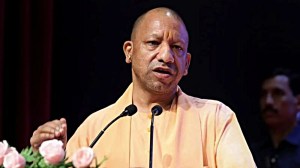Weathering the patriarchy storm
Mental health struggles among women conceal issues of social injustice.
 Imagine a solidarity of women coming together for justice, call it “Just Girls”, to externalise what has been internalised, politicise the personalised and make visible the invisibilised. (Source: Getty)
Imagine a solidarity of women coming together for justice, call it “Just Girls”, to externalise what has been internalised, politicise the personalised and make visible the invisibilised. (Source: Getty)“Humaare samaaj mein ladki hona hi gunaah hai (being a girl is a crime in our society)” — these words by a girl echoed the sentiments of countless young women growing up in a society where there are widespread, daily accounts of gender-based violence. Where girls are killed even before they are born because they bring “baddua” (curse), the mother of a child with disability is blamed for bringing “badkismat” (bad luck) into the family, a girl who doesn’t fit the social norms of beauty is dismissed as “badsurat” (ugly), and girls who challenge patriarchy are seen as “badchalan” (immoral). Where every step away from society’s warped idea of morality is shamed, stigmatised, and, at times, even banished.
Buy Now | Our best subscription plan now has a special price
We are trained into self-surveillance from an early age so as to jump through the culturally sanctioned hoops. This indoctrination is dangerous because it’s invisible to us. It’s like the air we breathe day in and day out, in our homes, schools, in the movies, literature, advertisements, news, and not to forget, on social media.
Therefore, it isn’t a surprise that mental health struggles in girls have skyrocketed, propelled by the pandemic. It’s convenient to blame them with the refrain “girls these days!” rather than look at the cultural context that breeds this dangerous self-surveillance. Convenient labels like depression, anxiety, eating disorders, self-harm, and addictions are a reflection of harm being done to women. In my decades of work as a therapist, I have never seen this intensity of self-doubt, self-hatred, and sense of failure among women as I’m seeing now. Where the internalised judgements of not measuring up to the society’s standards of beauty, worthiness and goodness, robs them of a sense of agency, purpose and connection. A perfect recipe for a long-and-winding mental health spiral.
It shows how significant it becomes for us to be accountable as a collective rather than seeing it as an individual responsibility. I was in awe of 14-year-old Rhea who stood up to her school’s male principal when he asked her to take her male classmate’s comments on her body as a compliment. He instructed her not to put kajal to “attract boys’ attention” because “usse apna hi mooh kaala hota hai (you only bring shame upon yourself by doing that)”. The best part was the next day all the girls (and some boys) in the class turned up at school with kajal! A big salute to a quietly subversive act of reclaiming justice and solidarity.
It would also be absurd to assume that women are passive recipients of hardships. Resistance has taken shape as social movements led by women on a larger scale such as Justice for Nirbhaya, Narmada Bachao Andolan, Shaheen Bagh protest, Chipko movement, Irom Sharmila and Mothers of Manipur against the AFSPA (Armed Forces [Special Powers] Act ) have shaken the cobwebs of our male-dominated society. Girls are challenging patriarchy at homes, schools, colleges, and critiquing society’s idea of being “sanskaari” (cultured), “sarvagunn sampanna” (possessing all virtues and merits), “samajhdaar” (understanding).
Mental health struggles in women conceal issues of social injustice. Mental health professionals cannot be complicit in reproducing the misogynistic culture. Rhea was referred to me for behavioural problems. As a therapist, it would have been so easy for me to collude with the school’s agenda in promoting injustices against girls.
A typical social response is to dismiss girls as “just girls.” As if they don’t matter, their voices can be silenced. Thus, through a play of words and a little punning, in our organisation, we call this initiative “Just Girls”, a solidarity of women coming together for justice — to externalise what has been internalised, politicise the personalised and make visible the invisibilised.
JUST STEPS
We spell out Courage (the acronym) and use the metaphor of journey to explain and keep track of our work. It’s helped us navigate our challenges and “just steps” that support young women in flipping the gaze on patriarchy and have a sense of agency, reclaim their preferred identity and foster solidarity.
Maybe you would like to try it out (irrespective of your gender, class, age, religion, etc.)?
Charting our territory: What are the recent challenges/storms (big or small) you had to face in life? What name would you give them?
On the stepping stones: Tiny, little or big things you do every day, despite the presence of these storms, that sustain you and keep you going?
Using the compass: What are the values and beliefs that make you stand strong and carry on? What do they reflect that is precious to you?
Resistance Torch: What names would you give to the big storms that young women face in our culture, in terms of societal pressure? How do we end up internalising these storms and questioning our worth? How does it push us into isolating ourselves, comparing ourselves with others, and telling ourselves that we are less? What are the small ways in which you have lit your Resistance Torch to stand up to the “patriarchal storm” and not let them define your worth?
Along with the tribe: Which person/s has introduced you to these skills of survival or is aware that these things are important to you? If someone gets to know you over months and years, what would they learn to appreciate about you?
Gifts to fellow travellers: What hopes do you have of contributing to your community or tribe? What small or big steps are you taking to support others in their journey of life? What advice would you give other young women your age?
Enduring adversity and finding our North Star: What stopped you from seeing yourself as a victim but more as a survivor/fighter/courage traveller? What would you call this skill that is able to endure and withstand all the storms?
As a young woman once remarked, “We are trees with deep roots, storms may try to destroy us but if we stand together as a forest and have strong roots, nothing can bring us down.”
Acknowledgement to all the young women who are on this Courage journey.
Shelja Sen is a narrative therapist, writer, co-founder of Children First Institute of Child & Adolescent Mental Health. She is a TED speaker, an international faculty at Dulwich Centre, Adelaide, and Tutor at University of Melbourne. Her latest book is Reclaim Your Life.
📣 For more lifestyle news, follow us on Instagram | Twitter | Facebook and don’t miss out on the latest updates!
Photos


- 01
- 02
- 03
- 04
- 05





























